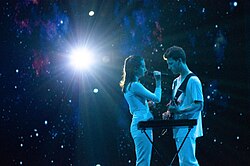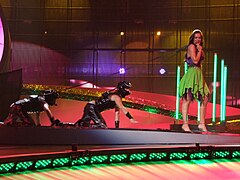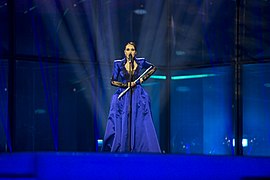Slovenia at the Eurovision Song Contest
- Broadcasting company
- RTVSLO
- First participation
- 1993
- Number of participations
- 25 (as of 2019)
- Highest ranking
- 7 ( 1995 , 2001 )
- Highest Score
- 167 ( 2019 SF )
- Lowest Score
- 5 ( 2004 SF )
- Points average (since first post)
- 41.44 (as of 2019)
- Average points per voting country in the 12-point system
- 1.08 (as of 2019)
This article deals with the history of Slovenia as a participant in the Eurovision Song Contest .
Participation before 1993
Before 1993, Slovenia indirectly participated in the competition as a republic of Yugoslavia . A total of six Yugoslavian contributions were made by the Slovenian broadcaster TV Ljubljana at the time.
- 1961 - The Serbian singer Ljiljana Petrović reached 8th place with the first Yugoslav contribution Neke davne zvezde in Cannes .
- 1962 - Lola Novaković from Serbia made it to 4th place with Ne pali svetla u sumrak in Luxembourg .
- 1966 - Berta Ambrož came 7th with Brez besed in Luxembourg .
- 1967 - Lado Leskovar reached 8th place with Vse rože sveta in Vienna .
- 1970 - Eva Sršen only made it to 11th place with Pridi dala ti bom cvet in Amsterdam .
- 1975 - The last Slovenian representative, the Pepel group in Kri , came only 13th with Dan ljubezni in Stockholm .
Regularity of participation and successes in competition
Slovenia participated in the ESC for the first time in 1993 as an independent state. After the country was able to win the Eastern European preliminary decision, the entry at the ESC only ended up in 22nd place. After this unsuccessful debut, the country had to sit out in 1994. The country was only allowed to participate again in 1995, where it achieved its best placement in the competition to date. The singer Darja Švajger landed in 7th place with her song Prisluhni mi and got 84 points, the highest score for the country to date. After this success, however, another disappointing result followed in 1996. The singer Regina only landed at number 21 out of 23. In 1997 things went up again, because the country reached number 10. In 1998, the Slovenian contribution only reached number 18. In 1999, however, Darja Švajger missed the best place to date In 1995, Landes achieved another place in the top ten with 11th place. Due to the rather weak phase from 1996 to 1998, the country had to suspend in 2000.
In 2001, when the country returned, the singer Nuša Derenda took 7th place, also the best Slovenian result in the competition. Since the singer Darja Švajger scored more points in 1995, the 2001 ranking is Slovenia's second-best result. After that, the country's competition went steadily downhill. In 2002, an average 13th place was achieved, while in 2003 only 23rd place was achieved. In 2004, when the semi-finals were introduced, Slovenia only achieved the penultimate place there and was eliminated in the semi-finals. With five points, Slovenia's participation in 2004 is the lowest number of points achieved in the competition to date. In 2005 and 2006 the Slovenian entries failed to qualify for the final either. It wasn't until 2007 that the country made it back to the finals after the singer Alenka Gotar took 7th place in the semifinals with her song Cvet z juga . In the final, the contribution reached 15th place. From 2008 to 2010 the final was always missed, even if the contribution from 2008 narrowly missed the final qualification with 11th place in the semifinals. It was not until 2011 that things slowly improved for the country in competition.
In 2011, the singer Maja Keuc reached 3rd place in the semifinals with her song No One , with Slovenia qualifying for the final for the first time since 2007. In the final, she achieved 13th place, the best result in nine years. With 96 points she also got a new high score for the country. In 2012, on the other hand, the Slovenian contribution only landed on the penultimate place in the semifinals, which meant that the final was missed again. In 2013 and 2014, the participation was unclear for a long time due to financial reasons, but in the end the country took part. In 2013, however, the country achieved its worst result in the competition to date, as the singer Hannah Mancini ended up in last place in the semi-finals. In 2014, the country made it back to the finals for the first time in three years, albeit with a tenth place in the semi-finals. In the final it was only enough for the penultimate place. In 2015, the country qualified for the finals for the first time two years in a row. After finishing 5th in the semi-finals, the duo Maraaya reached 14th place in the final. In 2016, however, the country missed the final for the first time since 2013. Also in 2017 when Omar Naber, who failed in the semi-finals for Slovenia in 2005, again failed to reach the final, the country only ended up in last place in the semi-finals. In 2018 the singer Lea Sirk made it to 8th place in the semi-finals, leading Slovenia into the final for the first time in three years. In the end, however, she only finished 22nd. In 2019, Slovenia was able to qualify for the final again and took 15th place with the duet Zala Kralj & Gašper Šantl and a new maximum number of 105 points.
Overall, only six of the 25 entries ended up in the left half of the table. In addition, the country has already missed the semi-finals ten times, making it one of the countries that have been eliminated most often in the semi-finals. Only Switzerland was eliminated more often (eleven times) in the semi-finals. With one last place, a few lower places and only three places in the top ten, Slovenia is one of the less successful countries in the competition.
List of posts
Color legend: - 1st place. - 2nd place. - 3rd place. - Equal points with last place. - Eliminated in the semifinals / in the qualification / in the Eastern European preliminary decision. - no participation / not qualified. - Cancellation of the Eurovision Song Contest.
| year | Interpreter | Title Music (M) and Text (T) |
language | translation | final | Semi-final / qualification |
National preliminary decision |
||
|---|---|---|---|---|---|---|---|---|---|
| space | Points | space | Points | ||||||
| 1993 | 1 x ribbon |
Tih deževen dan M: Cole Moretti; T: Tomaž Kosec |
Slovenian | A quiet, rainy day | 22/25 | 9 | 1/7 | 54 | Slovenski izbor za Pesem Evrovizije 1993 |
| 1994 | Not qualified | ||||||||
| 1995 | Darja Švajger |
Prisluhni mi M: Primož Peterca, Sašo Fajon; T: Primož Peterca |
Slovenian | listen to me | 7/23 | 84 | Qualified directly for the final | Slovenski izbor za Pesem Evrovizije 1995 | |
| 1996 | Regina |
Dan najlepših sanj M / T: Aleksander Kogoj |
Slovenian | The day of the most beautiful dream | 21/23 | 16 | 19/29 | 30th | EMA 1996 |
| 1997 | Tanja Ribič |
Zbudi se M: Saša Lošić; T: Zoran Predin |
Slovenian | Wake up | 10/25 | 60 | Qualified directly for the final | EMA 1997 | |
| 1998 | Vili Resnik |
Naj bogovi slišijo M: Matjaž Vlašič; T: Urša Vlašič |
Slovenian | Let the gods hear it | 18/25 | 17th | EMA 1998 | ||
| 1999 | Darja Švajger |
For a Thousand Years M: Sašo Fajon; T: Primož Peterca |
English | For a thousand years | 11/23 | 50 | EMA 1999 | ||
| 2000 | Not qualified | ||||||||
| 2001 | Nuša Derenda |
Energy M: Matjaž Vlašič; T: Urša Vlašič, Lucienne Lonchina |
English | energy | 7/23 | 70 | Qualified directly for the final | EMA 2001 | |
| 2002 | Sestre |
Samo ljubezen M: Robert Pešut ; T: Barbara Pešut |
Slovenian | Just love | 13/24 | 33 | EMA 2002 | ||
| 2003 | Karmen Stavec |
Nanana M: Martin Štibernik; T: Karmen Stavec |
English | Well well | 23/26 | 7th | EMA 2003 | ||
| 2004 | platinum |
Stay Forever M: Simon Gomilšek; T: Diana Lečnik |
English | Stay forever | Eliminated | 21/22 | 5 | EMA 2004 | |
| 2005 | Omar Naber |
Stop M: Omar Naber, Urša Vlašič; T: Omar Naber |
Slovenian | stop | Eliminated | 12/25 | 69 | EMA 2005 | |
| 2006 | Anžej Dežan |
Mr. Nobody M: Matjaž Vlašič; T: Urša Vlašič |
English | Mr. Nobody | Eliminated | 16/24 | 49 | EMA 2006 | |
| 2007 | Alenka Gotar |
Cvet z juga M / T: Andrej Babić |
Slovenian | Flower of the south | 15/24 | 66 | 7/28 | 140 | EMA 2007 |
| 2008 | Rebeka Dremelj |
Vrag naj vzame M: Josip Miani-Pipi; T: Amon |
Slovenian | To hell with that | Eliminated | 11/19 | 36 | EMA 2008 | |
| 2009 | Quartissimo feat. Martina |
Love Symphony M: Andrej Babić, Aleksandar Valenčić; T: Andrej Babić |
English | Love symphony | Eliminated | 16/19 | 14th | EMA 2009 | |
| 2010 | Roka Žlindre & Kalamari |
Narodnozabavni rock M: Marino Legović; T: Leon Oblak |
Slovenian | Popular folk rock | Eliminated | 16/17 | 6th | EMA 2010 | |
| 2011 | Maja Keuc |
No One M: Matjaž Vlašič; T: Urša Vlašič |
English | Nobody | 13/25 | 96 | 3/19 | 112 | EMA 2011 |
| 2012 | Eva Boto |
Verjamem M: Vladimir Graić; T: Igor Pirković |
Slovenian | I think | Eliminated | 17/18 | 31 | Misija Evrovizija 2012 | |
| 2013 | Hannah Mancini |
Straight into Love M / T: Hannah Mancini |
English | Straight into love | Eliminated | 16/16 | 8th | internal selection | |
| 2014 | Tinkara Kovač |
Spet (Round and Round) M: Raay; T: Tinkara Kovač, Hannah Mancini, Tina Piš |
English, Slovenian | Again (round and round) | 25/26 | 9 | 10/15 | 52 | EMA 2014 |
| 2015 | Maraaya |
Here for You M / T: Raay, Marjetka Vovk, Charlie Mason |
English | Here for you | 14/27 | 39 | 5/17 | 92 | EMA 2015 |
| 2016 | ManuElla |
Blue and Red M / T: Marjan Hvala, Manuella Brečko, Leon Oblak |
English | blue and red | Eliminated | 14/18 | 57 | EMA 2016 | |
| 2017 | Omar Naber |
On My Way M / T: Omar Naber |
English | On road | Eliminated | 17/18 | 36 | EMA 2017 | |
| 2018 | Lea Sirk |
Hvala, Ne! M / T: Lea Sirk, Tomy DeClerque |
Slovenian, Portuguese | No thanks! | 22/26 | 64 | 8/18 | 132 | EMA 2018 |
| 2019 | Zala Kralj & Gašper Šantl |
Sebi M / T: Zala Kralj , Gašper Šantl |
Slovenian | Oneself | 15/26 | 105 | 6/17 | 167 | EMA 2019 |
|
|
Ana Soklič |
Voda M: Ana Soklič , Bojan Simončič; T: Ana Soklič |
Slovenian | water |
Cancellation due to the COVID-19 pandemic by the EBU |
EMA 2020 | |||
| 2021 | Ana Soklič | internal selection | |||||||
National preliminary decisions
Almost all Slovenian entries, except in 2013, were chosen through a national preliminary decision. This usually takes place under the title Evrovizijska Melodija (EMA) or as EMA Evrovizija . Only in 1993, 1995 and 2012 did the preliminary round take place under the title Slovenski izbor za Pesem Evrovizije (1993, 1995) and Misija Evrovizija . As a rule, the preliminary round took place on an evening with between 12 and 17 participants. In 2001, 2002, 2009, 2010 and 2018, a semi-final took place before the national final. In 2007, 2008 and 2017 there were two semi-finals each, while in 2004 there were even four semi-finals.
In 2012, a casting show similar to the German system "Our Star for ..." was held for the first time, called Misija Evrovizija (Mission Eurovision) and stretched over several weeks. In 2013, RTVSLO decided to participate at short notice for financial reasons and could therefore not hold a preliminary decision due to lack of time.
There were controversies about the voting in 2006: A jury decided with a weighting of 1/3, all callers by phone and all votes by SMS. Saša Lendero received the most telephone and SMS votes, but not a single point from the jury. The Atomik Harmonik group took second place in the tele and SMS voting, but received no point from the jury either.
languages
Up to and including 1998, all entries were presented in Slovenian according to the rules. From 1999 onwards, the singing was mainly in English, namely in 1999, 2001, 2003, 2004, 2006, 2009, 2011, 2013, 2015, 2016 and 2017. In 2002, 2005, 2007, 2008, 2010, 2012, 2019 and 2020, however, the Contributions presented in Slovenian. In 2009 and 2014 the participant titles were sung in Slovenian and English. The 2018 contribution is special in that Lea Sirk introduced the last lines of Hvala ne in Portuguese, after which the rest of the text of the song was sung in Slovenian.
For a long time there was a rule that all contributions had to be sung in Slovene for the preliminary decision, so that there is also a Slovene version of almost all songs in English, and vice versa there is an English version of all other contributions in Slovene. In 1998, 2002, 2004 and 2010 German versions were also published.
Of the Slovenian contributions from the Yugoslav period, the texts 1961 and 1962 were in Serbo-Croatian and those from 1966, 1967, 1970 and 1975 in Slovenian.
Scoring
The following countries received the most points from or awarded the most points to Slovenia (as of 2019):
|
|
|
|
||||||||||||||||||||||||||||||||||||||||||||||||||||||||||||||||||||||||||||||||||||
Award of the highest rating
Since 1993 Slovenia has awarded the maximum number of points to 15 different countries, six of them to Croatia. In the semi-finals, however, Slovenia awarded the maximum number of points to eleven different countries, six of them to Serbia.
|
|
|||||||||||||||||||||||||||||||||||||||||||||||||||||||||||||||||||||||||||||||||||||||||||||||||||||||||||||||||||||||||||||||||||||||||||||||||||||||||||||||||||














